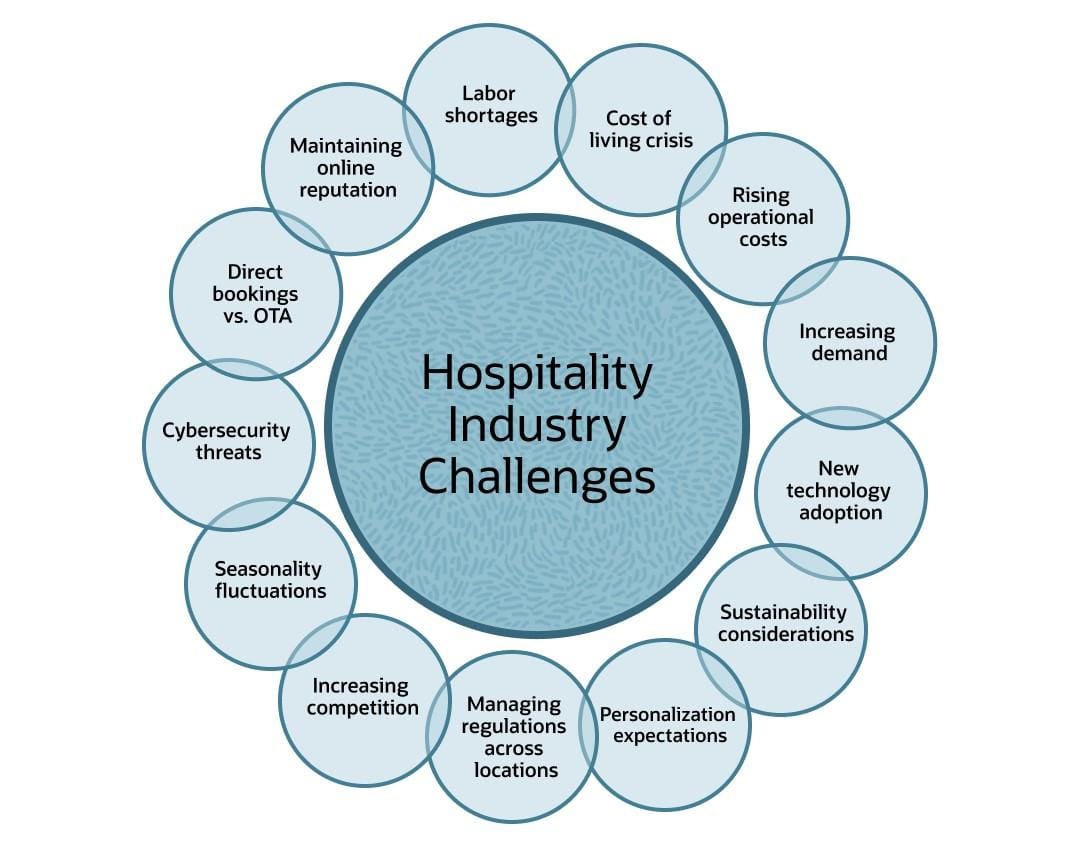Succeeding in the hospitality industry is notoriously difficult, and in recent years it has been especially challenging. Following the unprecedented supply-and-demand fluctuations of the pandemic, companies across the sector have become acutely aware of the impact that disruptions can have on their ability to survive and the importance of adapting to frequently shifting conditions, such as talent availability, rising costs, demand and increased competition. Nevertheless, considerable opportunities exist for hospitality companies that implement appropriate technologies and processes to efficiently manage these factors, ensuring that they can attract customers, provide outstanding experiences and foster loyalty.
What Are Hospitality Industry Challenges?
The ultimate goal for any hospitality company is to deliver high-quality guest experiences while maintaining profitability. But a number of factors must coalesce to achieve the sweet spots between capacity and demand and revenue and costs.
A problem or unexpected change in any area — food costs, labor availability, regulatory requirements, guest expectations, discretionary spending — can swiftly and profoundly impact a hospitality company’s fate. A restaurant that struggles with employee turnover, for example, may not be able to serve as many diners, could see its food quality and service suffer and might take a hit to its reputation. At the same time, the restaurant may have to spend more time on training and offer higher wages or other benefits to attract and retain workers. Thus, the labor issue hits the restaurant on both the revenue and expense sides, making it much harder to turn a profit.
Key Takeaways
- The hospitality industry — which includes hotels and lodging, food and beverage, travel and tourism and events and recreation companies — is rife with challenges and competition.
- Labor shortages, consumer spending shifts and rising operational costs are just a few of the issues facing hospitality firms.
- The most successful hospitality companies tame these challenges by assembling the necessary data, processes and technology to make the best decisions for their businesses and their customers.
Hospitality Industry Challenges Explained
The hospitality industry is made up of a variety of businesses, each with its own particular business model and challenges — from cruise ships and airlines, to bars and restaurants, to hotels and homestay providers, to theme parks and event companies. They vary in size from small to midsized businesses managing a single location to large global brands with hundreds of sites.
However, the four major sectors that make up the hospitality industry — hotels and lodging, food and beverage, travel and tourism and events and recreation — face some common challenges. They must contend with scarce human resources, supply-and-demand fluctuations, shifting customer demands, rising operational costs, changing regulatory requirements and new expectations for sustainability and personalization — just to name a few. To succeed and grow, hospitality firms must manage an array of issues in a way that enables them to optimize revenue and costs while also differentiating themselves in the market and delivering quality experiences to guests.
13 Hospitality Industry Challenges
There’s no shortage of challenges facing the hospitality industry today. To be successful, companies must put together the requisite data, processes and technology to overcome obstacles and make informed decisions for their businesses and their customers. Here are 13 of the most common challenges facing hospitality companies of all types.

- Labor shortages: Talent shortages are a concern in nearly every sector these days. But in the people-centric hospitality space, labor is a primary success factor. Whether a neighborhood diner or a global airline, all hospitality businesses depend on people serving people. But not only is talent in short supply across the industry, record turnover rates and wage inflation have further increased labor costs — one of a hospitality company’s biggest expense categories. Indeed, labor supply and labor costs were the top challenges cited by hospitality professionals in STR’s 2023 Hospitality Industry Sentiment survey. Additionally, more than half of the hotel chief financial officers surveyed by EY said labor shortages were causing the most strain on their companies’ net operating income, with nearly all survey participants saying they plan to increase staff pay — a wise investment, given that without enough skilled workers, a hospitality company’s guest experience can suffer.
- Cost of living crisis: Inflation — the rate at which prices, in general, rise and purchasing power falls — hits hospitality firms on both the demand side and the supply side. On the demand side, hospitality companies, whether a coffee chain or a Caribbean resort, depend largely on consumer discretionary spending. When consumers have less cash in their pockets, their propensity to indulge in niceties, such as dining out or taking a weekend getaway, goes down. Indeed, a 2023 report from Booking.com found that three-quarters of travelers said the rising cost of living was impacting their spending plans. Similarly, some hospitality companies, such as hotels, airlines and restaurants, also rely on what may be deemed as non-essential business travel and entertainment spending — often the first cost expense categories businesses cut in uncertain economic times. On the supply side, inflation can mean increased operational costs resulting from rising prices for everything from jet fuel to flour.
- Rising operational costs: The effective management of operating costs is right up there with managing labor costs in terms of importance for hospitality companies, as both directly impact financial performance. Inflationary pressures on everything from food costs to energy bills can impact profitability. Managing rising operational expenses without affecting the quality of a product or service is essential to profitability and growth.
- Increasing demand: Pandemic lockdowns did a number on hospitality companies across the board, but many indicators point to continued growth beyond pre-pandemic levels. While this is welcome news to hospitality companies, these businesses must also figure out how to meet this increased demand amid rising costs and labor shortages.
- New technology adoption: The pandemic saw a sudden upswing in technology adoption across the hospitality sector, from cloud collaboration and communication tools that enabled remote work to digitized “order and pay at table” and curbside pickup solutions. These technologies continue to offer opportunities for hospitality firms to improve efficiency, cut costs, meet new demand and deepen relationships with customers, suppliers and partners. But keeping up with the pace of technological change and implementing the latest and greatest can present challenges, such as significant upfront costs, training expenses, potential change management issues and possible lack of adoption by employees or customers. The successful integration of new technologies requires effective planning and due diligence to ensure that these initiatives deliver expected benefits and returns on investment.
- Sustainability considerations: Companies across industries are embracing more sustainable practices, both for their own cost containment and longevity and to meet demand for more sustainable business practices from key stakeholders and customers. The 2023 Booking.com report found that 76% of travelers said they want to travel more sustainably during the year ahead. The sustainability imperative is growing, and hospitality companies must work to integrate sustainability into their management and operations. That means not only making operational changes, such as purchasing eco-friendly supplies and giving hotel guests the option to forgo daily housekeeping, but also analyzing data throughout the supply chain in order to integrate more renewable energy sources, reduce waste and promote sustainable hospitality ecosystems.
- Personalization expectations: Ever-advancing technology capabilities have trained consumers to expect a high degree of personalization from the companies with which they interact. Guests of hotels, airlines, cruise ships, restaurants and other hospitality businesses demand a level of one-on-one interaction and experiences tailored to their individual preferences and needs. Hospitality companies will need to leverage technologies, such as digital customer analytics engines, AI-powered virtual assistants and digital feedback mechanisms, to provide personalized service and address customer concerns quickly.
- Managing regulations across locations: Companies operating in the hospitality industry must comply with numerous regulations, including health and safety, environmental, licensing and labor laws. As the vast majority of hospitality companies digitize their operations, they must also meet legal requirements for data governance, privacy and security. Keeping up with these changing regulations is paramount and can be a particular challenge for companies operating in multiple geographies and jurisdictions. Failure to comply can result in fines, legal issues and reputational damage.
- Increasing competition: The hospitality industry is notoriously competitive. And the transparency and information availability of the digital era means customers can quickly and easily find a better price, seek out different amenities or offerings or leap into the arms of a competitor. It’s imperative for hospitality firms to continually monitor competitor performance, strategies and prices to determine how best to differentiate themselves from their industry rivals. At the same time, hospitality companies will want to avoid pricing wars in order to keep market rates reasonable. It’s a delicate balancing act in a competitive market to provide the best service while still maximizing profitability.
- Seasonality fluctuations: All sectors within the hospitality industry must anticipate fluctuations in demand, and many deal specifically with high and low seasons. The busy seasons mean greater demand and — with the right financial controls and demand management in place — increased profitability. But low seasons mean drops in demand, and hospitality companies must be able to effectively manage their cash flows to endure the lean times. While quarterly budgeting and forecasting are a best practice across sectors, many hospitality companies have seen the need to adopt rolling forecasts to keep up with more frequent fluctuations in demand.
- Cybersecurity threats: Recent years have seen a string of high-profile cybersecurity attacks and data breaches in the hospitality industry — from the headline-grabbing ransomware incidents that cost leading hotel and casino businesses hundreds of millions of dollars to the theft of personal data of thousands of pilots applying for jobs at major airlines. The volume of personal and payment data that hospitality firms process and store makes them a high-value target for cybercriminals. Mitigating mounting and increasingly complex cyber-risk requires hospitality operators to invest in cybersecurity tools and processes that can keep pace with the cyberthreat environment.
- Direct bookings vs. OTA: Online travel agencies (OTAs) have long been both boon and bane to the hospitality industry. Their now mass adoption can funnel increased bookings and sales to restaurants, hotels, event and travel and tourism companies. But these OTAs have also been increasing their own sales commissions and insisting on more onerous terms and conditions that can erode margins for hospitality providers.
- Maintaining online reputation: Hospitality companies are acutely aware that their next bad review is just a click away. The fact is that most savvy travelers will read online reviews before booking a vacation, hotel room or dining reservation. Yet, managing online reputation remains a challenge for many hospitality firms. It requires daily vigilance to keep on top of what’s being said as well as to maintain constructive interactions and resolutions with unsatisfied customers.
Strategies and Solutions for Hospitality Industry Challenges
Hospitality companies undoubtedly face substantial challenges, yet there is no shortage of successful hospitality brands — from industry stalwarts to digital startups. These successful ventures are born from a profound understanding of the art of attracting customers, enriching their experiences and cultivating their loyalty through the adoption of proven strategies and solutions, including those outlined below.
Workforce Management and Development
Above all, hospitality is about people serving people. So, addressing labor shortages and other human resource issues is job number one. Creating a culture and environment that attracts and retains skilled workers and investing in effective, ongoing training and development is crucial. These people strategies are key to increasing customer satisfaction, fostering customer loyalty and enabling business growth in the hospitality industry. Two key strategies are:
- Employee training and development: As in many service industries, turnover is a fact of life in hospitality, particularly in customer-facing roles. With talent shortages at all-time highs, investing in comprehensive training and development programs is more important than ever, not only to bring new hires up to speed but also to advance the skills of existing employees. Offering the opportunity to grow also benefits employees (and makes them more likely to stay) and boosts business performance.
- Employee engagement and retention: Fostering a working environment that keeps employees engaged and happy is also key. The better the work experience a hospitality firm offers its employees, the more likely its workforce will be to deliver outstanding experiences to guests. Creating well-thought-out recruitment and retention strategies, cultivating a culture of inclusion and purpose and connecting the dots between business success and what matters to the workforce all help to recruit and retain skilled workers in a highly competitive talent market. Those hospitality companies with high retention rates offer employees more than just a job or a wage by providing career paths and benefits that matter to them.
Sustainability Initiatives
Eco-friendly practices and other corporate social responsibility efforts are no longer just nice to have; customers, investors, employees and other key stakeholders increasingly expect them. There are numerous opportunities for companies in the hospitality sector to move the needle on sustainability, from simple changes in the products they purchase to more advanced data-driven initiatives to reduce their overall impact. Investing in enterprise software that increases transparency throughout the company and its supply chain is foundational to sustainability efforts. Other strategies include:
- Eco-friendly practices: Adopting new approaches in both procurement and operations is one of the most straightforward ways hotels, airlines, restaurants and other hospitality businesses can make significant headway in becoming more environmentally conscious. Water and energy usage, waste and carbon emissions are primary areas of focus. For example, hospitality firms can purchase more eco-friendly products by eliminating single-use plastics and optimize their operations to reduce waste. They can also rethink practices that contribute to their environmental footprint, such as daily housekeeping, better manage energy consumption and sourcing and work with suppliers that are likewise dedicated to lessening their impact on the environment. Educating guests about these efforts and encouraging their participation can also be beneficial.
- Corporate social responsibility: Corporate social responsibility, increasingly subsumed as part of what’s now called a company’s environmental, sustainability and governance (ESG) strategy, is another important area of focus for hospitality companies. For example, hospitality firms may find value in developing companywide diversity, equity and inclusion (DEI) goals and initiatives. Building diverse workforces, supplier networks and franchises and investing in their increased DEI initiatives can benefit not only the business itself, but also its partners and the communities in which it operates. Many large hotel companies, for example, have ambitious goals to increase their purchasing from local, minority- and women-owned and small and midsized businesses and suppliers.
Diversification and Risk Management
While disruption can sometimes be unexpected in the hospitality industry — from a global pandemic that halts all travel to a rainy week at a theme park — companies can take steps to mitigate these business risks and their impact on operations, customers and financial performance. Here are two recommendations.
- Diversification: Putting all your eggs in one basket is a bad idea for any business, and hospitality companies are no different. Instead, they can diffuse some risks inherent in the industry by diversifying their products, services, locations, customers or markets. We saw this happen on the fly during the pandemic as high-end, Michelin-starred restaurants shifted their approach to become takeout restaurants. High-end hotel chains that have expanded to incorporate midrange, boutique and budget lodging options, meanwhile, are an example of market diversification. These types of strategies enable greater resiliency and agility.
- Crisis management and contingency planning: Accepting that disruption is inevitable, hospitality leaders can put plans in place ahead of time, laying out how the business will respond to any number of events and issues. Depending on the type of situation a hospitality firm anticipates, these efforts may include financial contingency plans, cybersecurity incident response plans or backup plans for operations in the event of an emergency. Creating these plans, making sure everyone understands their roles in the response and practicing the plan in a low-stakes environment ensure that no one has to wing it when a crisis strikes.
Customer Relationship Management
Meeting customer expectations is paramount to success in the experience-driven hospitality industry. Fostering strong relationships with existing and potential guests starts with good customer relationship management software that ensures that everyone in the organization has access to the same guest information and can deliver a consistent experience across all customer interactions. The most successful hospitality firms go even further to personalize customer experiences, meet and exceed customer expectations and boost customer satisfaction and loyalty. Key strategies include:
- Enhancing customer experience: Every hospitality company, from fast food restaurants to five-star hotels, is in the experience business. What that experience looks like will differ, of course. A fast food restaurant may focus on speed, accuracy and customer ease, while a luxury hotel will emphasize comfort, high-end amenities and individual attention. But the overarching goal is the same: customer-centricity. The most successful hospitality companies continually improve and innovate upon the customer experience throughout the guest journey, from initial interactions to support during and after a guest’s experience. Customer-centric hospitality companies invest in the people, processes and technologies that enable them to better connect with and understand their current and future customers in order to define and deliver winning guest experiences.
- Managing customer expectations and satisfaction: Hospitality companies that meet and exceed guest expectations experience an increase in customer satisfaction and loyalty, which has a positive impact on their bottom lines. This has as much to do with actively managing customer expectations and satisfaction as anything. Being clear about what the brand does and doesn’t offer in terms of products, services, prices and experience is paramount in avoiding misunderstandings and disgruntled customers. Just as important is delivering on a brand’s promises with well-trained and empowered employees, effective technology and processes and experiences that align with expectations. Finally, hospitality firms should create clear and effective feedback mechanisms that customers can use when a company fails to meet the mark, which will happen. Creating a guest-friendly complaint experience with rapid response is essential.
Branding and Market Positioning
In the highly competitive hospitality space, customers have an array of options to choose from when it comes to dining, lodging, travel and entertainment. Engaging in market research and competitive analysis is essential for hospitality companies to determine how to make their business stand out from the rest. Here are some tips.
- Strategic market positioning: Understanding where a hospitality company can deliver the most value is the first step in developing a unique value proposition for customers. There are a number of ways a hospitality company might position itself — say, price or quality — depending on the business’s particular strengths or target customers. Whatever the approach, performing strategic market positioning is essential. This involves a business’s analyzing its position in the market as compared with its competitors and identifying opportunities to set itself apart. With that insight, a hospitality company can develop a more targeted position in the market.
- Brand differentiation: Hospitality companies can develop and implement a brand differentiation strategy, clarifying and executing on a unique offering that will connect with target customers. Having performed strategic market positioning analysis, hospitality companies are in a better position to distinguish their brands from others in the eyes of customers. With this differentiation in mind, hospitality leaders can also perform value chain analysis to optimize their processes in ways that deliver on their differentiated brand.
Technological Advancements and Innovations
In some cases, it’s a personal touch — an employee who goes above and beyond to make a guest’s flight more enjoyable, or a front desk clerk who offers early check-in to a weary international traveler — that wins customers over in the hospitality industry. In other instances, it’s rigorous efficiency and reliability, such as digital check-in and self-service booking. No matter the strategy, it likely involves technology. Hospitality companies across sectors are evaluating and implementing digital enhancements and innovations to level up their customer experiences. Strategies include:
- Implementing efficient and effective technologies: Some of the most impactful technology investments hospitality companies can make are those that streamline and automate their operations and customer experiences. On the back end, hospitality companies can invest in enterprise resource planning (ERP) software to consolidate and analyze key financial, operational and customer data for decision-making. On the front end, they can implement customer-facing technologies, such as digital check-in functionality, self-service booking and mobile ordering and payment systems.
- Balancing technology with human interaction: While there may be some customer segments that prefer digital-only interactions, most hospitality companies seek out the sweet spot between technology improvements and person-to-person service. Integrating new digital tools in a way that enables employees to provide exceptional customer services is the ideal for many hospitality brands. In many cases, technology investments in automation can free up the human workforce to focus on the guest or customer.
How ERP Software Helps Hospitality Businesses
ERP software offers a number of benefits to hospitality providers. First and foremost, it serves as a single system of record across the company, providing shared data and insight across all key performance indicators (KPIs). Many hospitality companies have amassed a collection of point solutions over the years — point-of-sale systems, human resources software, inventory management tools, financial systems — that can encumber their ability to nimbly respond to the challenges of a dynamic market.
The foundation of data and insight that a modern, integrated ERP system provides can empower hospitality leaders to make faster and better-informed decisions on a number of fronts. For instance, an ERP system can enable hospitality firms to better understand and control costs, hone supply and demand forecasts, adapt to changing conditions, develop plans to meet new demands and opportunities, simplify and standardize procurement, improve controls to manage risk and accurately and efficiently report on business results.
Cut Operational Costs and Increase Efficiency Across Your Hospitality Business With NetSuite
Having a single, scalable system that brings key data sources together and enables drill-down analytics is essential to managing the multiple challenges that exist in hospitality. NetSuite’s unified hospitality management cloud platform delivers a centralized view of a hospitality business with role-based dashboards, reports and KPIs. It enables hospitality companies to connect or replace siloed solutions and digitize and automate manual processes. NetSuite’s hospitality management platform offers functionality designed for specific roles, from the front-of-house restaurant manager to a cruise operator’s CFO, enabling all involved to make data-informed decisions. Designed specifically for hospitality companies, the software offers analytics to help build better pricing strategies, control labor and food costs, forecast demand, explore new delivery models, enter new markets and improve the customer experience.
Those who choose to go into the hospitality business have a passion for making people happy. But it takes much more than good intentions to succeed. Addressing common hospitality industry challenges — from low seasons and high labor costs to shifts in consumer spending and regulatory compliance — requires investing in the tools and processes to anticipate and respond accordingly. Hospitality companies that invest in strategies and solutions for managing these issues will be best positioned to control costs, execute on their brand promises, capitalize on increasing demand and keep customers coming back.
Hospitality Industry Challenges FAQs
What is a major challenge for the hospitality industry?
One of the biggest challenges in the hospitality industry is labor availability and costs. The hospitality sector is known for high employee turnover, even in the best of times, particularly in customer-facing roles. Record turnover rates and wage inflation have driven up labor costs, which is one of the biggest expense categories for restaurants, hotels, airlines and other businesses that operate in this industry.
What are some technology challenges that the hospitality industry is facing now?
One of the biggest technology challenges that hospitality companies face today is providing guests with a seamless, personalized experience. Many companies have adopted an array of point solutions over the years, making it difficult to create a single view of the guest experience across the customer lifecycle. Additionally, keeping up with the pace of technological change and implementing the latest and greatest can present challenges, such as significant upfront costs, training expenses, potential change management issues and possible lack of adoption by employees or customers.
Why is technology both a challenge and beneficial strategy for hospitality businesses?
Technology enhancement and innovation can change the game for hospitality companies, helping them streamline operations, offer better customer experiences, deliver new products and services, expand their markets and grow their revenue. But keeping up with the pace of change in technology and customer expectations for digital and personalized experiences isn’t always easy.
What are the seven critical risks facing the hospitality industry?
Seven of the most critical risks facing the hospitality industry are labor shortages (which are at or near record levels), rising operational costs, increasing demand (amid labor shortages and rising operational costs), cybersecurity threats, technology disruption, increased competition and the demand for more sustainable operations.
What are three factors that can affect the hospitality industry?
Three of the biggest factors that can affect the hospitality industry are consumer and business discretionary spending, regulatory requirements and sustainability considerations.









